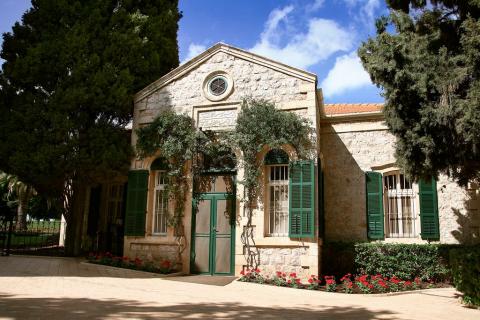‘Abdu’l-Bahá stayed, once again, in the Hotel Marquardt. During this second visit to Stuttgart, which also lasted a week, He was mostly unwell. The cold contracted in Budapest had persisted and was now affecting His chest. The Bahá’ís of Stuttgart had arranged and advertised a meeting for the evening of the 25th at the Burger Museum. In the afternoon the condition of His chest worsened, causing great concern. Physicians told Him that He should not go out, and should use His voice as little as possible. His attendants, whom He had sent on to the meeting, felt that the large and eager assemblage there would be disappointed and dismayed should they be deprived of meeting ‘Abdu’l-Bahá. They returned to the hotel with a plan which they thought would both safeguard ‘Abdu’l-Bahá's health and make it possible for the people to meet Him. A saloon car, well-protected from the elements, would take ‘Abdu’l-Bahá to the Museum where, in a room apart from the main hall, people could be allowed into His presence. As soon as they presented this plan to ‘Abdu’l-Bahá and told Him of the eagerness and disappointment of the audience, He arose. Physicians had made Him stay indoors, He said; but His health was for the purpose of serving the Faith. While Wilhelm Herrigel was giving a talk in His stead, He walked into the hall, to the utmost delight and surprise of the audience, and using His full voice delivered a discourse on the need of world peace and the power that can guarantee it. The talk over, ‘Abdu’l-Bahá was about to leave and return quickly to His hotel, when a voice was heard, wailing. He 390 stopped and asked His attendants to make enquiries. It was found that a lady who had tried to reach ‘Abdu’l-Bahá, and had been kept back by the press of the crowd, was weeping. ‘Abdu’l-Bahá stayed to speak to her words of great kindness. The next day, to questions about His health, He answered that the previous night's venture, although considered very risky, had proved the right medicine for Him.
Health
After arriving in Port Said, ‘Abdu’l-Bahá had initially planned to continue immediately to Europe, but His poor health forced him to stay in Port Said it for a month. While there, he asked Siyyid Asadu'llah-i-Qumi: Do you realize now the meaning of my statement when I was telling the friends that there was a wisdom in my indisposition? The wisdom was that I must always move according to the requirements of the Cause.
On the morning of March 26 when I was close by His cabin, ‘Abdu’l-Bahá came out and said: `Last night I slept comfortably. For a long time I could not sleep well on account of the ache in my bones but now it is gone altogether.’ I mentioned that the humidity in Port Alexandria was very high and that it must not have been good for His health. `Yes,’ He said, `the climate here is better because at sea the humidity ascends and thus is not harmful, whereas there is more humidity in coastal regions and this is harmful to health. Besides, an electro-magnetic force is produced by the moving and surging of the water which is very beneficial to health.’
On the return to the hotel the carriage drove through the park roads. The Master remarked, `America will make rapid progress in the future but I am fearful of the effects of these high buildings and such densely populated cities; these are not good for the public health.’
One day ‘Abdu’l-Bahá asked about the health of Mr Haney. He told the Master quite frankly, ‘My body is always well, but I am receiving so much Spiritual Food while here that I fear I shall have Spiritual indigestion.’ But his Host assured him: ‘No, you are going to digest it, for He who gives you the Spiritual Food is going to give you digestive power.’
